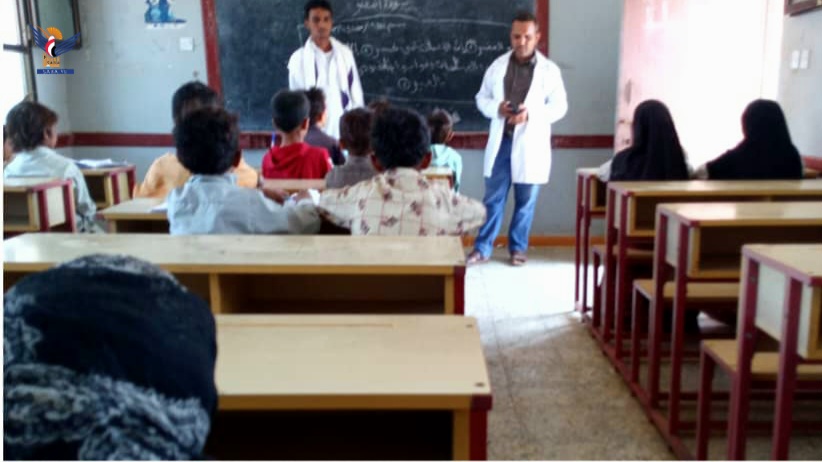Sana'a - Saba:
This year's summer activities and courses were not limited to theoretical and scientific aspects, but rather included health and environmental awareness programs on the importance of maintaining public cleanliness and protecting the environment from pollution, thus reducing the spread of diseases and epidemics.
The Ministry of Health and Environment, represented by the National Center for Health Education and Information, was keen to link health and environmental aspects with Quranic culture, which encourages attention to cleanliness and purity as part of faith, this, in turn, serves as a behavior that students will build upon from an early age and continue to practice throughout their lives.
When students' understanding of health concepts and how to deal with them, especially regarding first aid, is reinforced, and becomes a culture not already possessed by those enrolled in the courses, the benefits accrue to families and society.
The health education process aims to raise awareness by providing individuals with information and experiences with the goal of influencing their inclinations, knowledge, and health behaviors, both for themselves and for society, health education is a set of activities aimed at raising health knowledge and instilling healthy behaviors in individuals and communities.
The Director General of the National Center for Health and Population Education and Information at the Ministry of Health and Environment, Dr. Yousef Al-Hadhri, explained to the Yemeni News Agency (Saba) that the Ministry implemented health and environmental awareness and training activities from Shawwal 14 to Dhu al-Qi'dah 24, 1446 AH, in various summer schools across the governorates.
He stated that the summer schools were provided with medicines, emergency medical supplies, hygiene materials, and masks, and that students were educated on health issues, most notably personal and public hygiene, combating infectious diseases, proper nutrition, environmental conservation, and other health issues.
Dr. Al-Hadhri indicated that students were trained in first aid skills, proper handling of bleeding and injuries, and other first aid techniques by a health cadre.
According to statistics from the Ministry of Health, a copy of which was received by the Yemeni News Agency (Saba), field visits were conducted to 4,708 summer schools in 221 districts in 15 governorates, where 297,793 male and female students were educated on health and environmental aspects.
It reported that 22,231 students were trained in first aid and proper handling of bleeding and injuries, in addition to providing medicines, medical supplies, first aid kits, and hygiene and educational materials.
Statistics indicated that 3,724 health workers participated in health and environmental awareness and first aid training, the awareness program included Quranic visions, general hygiene, and lectures on first aid, combating infectious diseases, proper nutrition, and proper handwashing.
It noted that in Ibb Governorate, 577 summer schools were targeted in 20 districts, raising awareness among 51,118 students and training 5,959 students in first aid, with the participation of 435 health workers. Meanwhile, in Amran Governorate, 246 schools were targeted in 20 districts, raising awareness among 23,638 students and training 2,584 students in first aid, with the participation of 266 health workers.
Statistics showed that in Jawf Governorate, 133 schools in 15 districts were targeted to educate 7,102 male and female students, and 487 were trained in first aid with the participation of 133 health cadres. Meanwhile, in Dhamar Governorate, 2,177 summer schools in 12 districts were targeted to educate 134,297 male and female students with the participation of 2,025 health cadres.
In Raymah Governorate, 8,276 students were educated in 66 summer schools across six districts, in addition to 4,115 students receiving first aid training, with the participation of 42 health workers.
468 schools in 31 districts in Hajjah Governorate were targeted, with 13,965 students educated and 2,129 students trained in first aid, with the participation of 69 health workers.
In Al Hudaydah Governorate, 16,390 students were educated in 262 schools across 26 districts, with 1,781 students trained in first aid, with the participation of 195 health workers.
In Mahwit, 383 summer schools in nine districts were targeted, with 18,992 students educated and 2,106 students trained in first aid, with the participation of 188 health workers.
Statistics indicated that in Marib Governorate, 3,679 male and female students were educated in 51 schools across nine districts, and 176 were trained in first aid, with the participation of 38 health cadres.
In Sana'a Governorate, 8,076 male and female students were educated in 133 schools across 16 districts, and 1,562 were trained in first aid, with the participation of 131 health cadres.
In the capital, Sana'a, 3,781 students in 50 schools across 10 districts were educated, and 300 were trained in first aid, with the participation of 48 health workers.
Meanwhile, 74 schools in 11 districts in Taiz Governorate were targeted to educate 4,315 students, and 131 were trained in first aid, with the participation of 34 health workers.
In Al Dhale' Governorate, 10 schools in four districts were targeted to educate 120 students and train 71 in first aid, with the participation of 10 health workers.
In Al Bayda Governorate, 74 schools in 20 districts were targeted to educate 3,464 students and train 830 in first aid, with the participation of 106 health workers.
M.M

| more of (Reports) |




